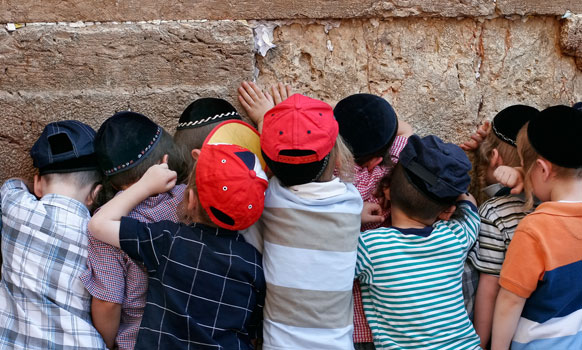
This Traditional Elul Prayer Gives Me Strength in Tough Times-
Years ago, I had just arrived at seminary in Israel and soon after I learned that a friend who was key to inspiring my journey had misrepresented herself to me. I was confused, upset and didn’t know how to continue having a spiritual experience when I had been so let down. I confided in a rebbetzin and she gave me a prescription: say Psalm 27, aka Tehillim Chof Zayin, L’Dovid Hashem Ori, every day for the next 40 days.
What did saying a perek of tehillim have to do with getting over being hurt? As it turned out, everything.
As I said L’Dovid Hashem Ori in English, I pictured the person who had hurt me as the enemy that Hashem was saving me from. The passage “my head is raised above my enemies around me” gave me poise when I ran into this person, empowering me to stay strong despite the challenge. “Strengthen yourself and He will give you courage,” allowed me to remember that I was not alone in those dark moments. Every day I said these words, they heartened me. Soon, I was back to enjoying my time in Israel, learning well and had truly moved on from the hurt this person had caused.
While I still said the perek each Elul, at times of other difficulties in my life, I picked up saying it daily again to great effect. From health issues, to moving countries and states, to intense fear when Covid first broke out, to tough times at work, with neighbors and more, saying L’Dovid Hashem Ori has helped me to feel strong enough to handle anything that comes my way.
Kabbalists write that a person who says L’Dovid Hashem Ori with purity of heart will have his prayers answered, and that saying it can also overturn harsh decrees. The midrash gives us the custom to say L’Dovid Hashem Ori during the entire 40 day period of repentance from Rosh Chodesh Elul through the end of Sukkos. The key to this is found in allusions to this time peppered throughout the prayer, which unfold like a code. “Hashem is my light” refers to Rosh Hashanah, “and My Salvation” refers to Yom Kippur. “Hiding in his shelter” refers to Sukkos. Additionally the word Elul appears backwards in it. The name of Hashem is included within it thirteen times, the number alluding to the Attributes of Mercy that we recite elsewhere in Elul and Yomim Noraim prayers.
When I first learned this about the perek, I was astounded. Although the deeper meaning of other prayers and tehillim I had learned were inspiring, the clues in this one stood out to me. We are literally being given a special code to help ourselves gain access to Hashem during times of trying to get closer to Him.
While the reasons for saying L’Dovid Hashem Ori during the month of Elul to prepare for the Yomim Noraim may be spiritually profound, there is a practical application as well: saying these words reminds us that even though many things might come into our lives to challenge us, ultimately Hashem is in charge and is protecting us, even if we can’t recognize it in the moment. Armies can besiege us, our families can sometimes let us down, but Hashem will always be there for us.
Even though I realize that I can (and do!) say this perek at any time, knowing that it has special significance during Elul and Tishrei makes it even more powerful. In addition, the fact that it is being said by Jews all over the world, all of whom are strengthening their connection to Hashem during this time makes me feel like I’m a part of something bigger than myself, and a part of something that just might have the power to help the entire world merit a sweet new year.
If you found this content meaningful and want to help further our mission through our Keter, Makom, and Tikun branches, please consider becoming a Change Maker today.







